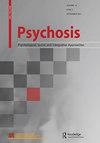The mediation role of schizotypal traits in the relationship between childhood trauma and earlier onset of panic disorder
IF 1
4区 医学
Q4 PSYCHIATRY
Psychosis-Psychological Social and Integrative Approaches
Pub Date : 2021-08-16
DOI:10.1080/17522439.2021.1957992
引用次数: 0
Abstract
ABSTRACT Objective We hypothesized that, if childhood trauma is associated with schizotypal traits, schizotypal traits may mediate the relationship between childhood trauma and the earlier onset of panic disorder (PD). Methods A total of 86 patients (49 females, 37 males), with PD aged between 18 and 65 years, were evaluated using the Panic and Agoraphobia Scale (PAS), the Schizotypal Personality Questionnaire-Brief (SPQ-B), and the Hamilton Anxiety Rating Scale (HARS). Results The mean age was 38.7 ± 12.8 years (range = 19-65 years). Total scores of schizotypal traits (r = -0.41, p<0.001), and childhood trauma (r = -0.31, p = 0.004) were inversely correlated with age at onset of PD. There was a significant correlation between the severity of schizotypal traits and childhood trauma (r = 0.55, p<0.001). After the mediation analysis, the direct effect of childhood trauma on age at onset of PD was no longer significant (Exp(B) = -0.133, p = 0.273). The indirect coefficient for schizotypal traits was consistent with complete mediation (Exp(B) = -0.801, p = 0.001). Discussion We suggest that schizotypal personality traits which are significantly associated with childhood trauma, may influence the onset of PD from early life.分裂型特征在童年创伤与惊恐障碍早期发病关系中的中介作用
摘要目的我们假设,如果童年创伤与分裂型特征相关,那么分裂型特征可能在童年创伤与早期惊恐障碍(PD)之间起中介作用。方法对86例年龄在18 ~ 65岁的PD患者(女性49例,男性37例)采用惊恐与广场恐怖量表(PAS)、分裂型人格问卷简表(SPQ-B)和汉密尔顿焦虑评定量表(HARS)进行评估。结果患者平均年龄38.7±12.8岁(范围19 ~ 65岁)。分裂型特征总分(r = -0.41, p<0.001)和童年创伤总分(r = -0.31, p = 0.004)与PD发病年龄呈负相关。精神分裂型特征的严重程度与童年创伤有显著相关性(r = 0.55, p<0.001)。经中介分析,童年创伤对PD发病年龄的直接影响不再显著(Exp(B) = -0.133, p = 0.273)。分裂型性状的间接系数与完全中介一致(Exp(B) = -0.801, p = 0.001)。我们认为,与童年创伤显著相关的分裂型人格特征可能从早期生活开始影响PD的发病。
本文章由计算机程序翻译,如有差异,请以英文原文为准。
求助全文
约1分钟内获得全文
求助全文
来源期刊
CiteScore
2.20
自引率
8.30%
发文量
36

 求助内容:
求助内容: 应助结果提醒方式:
应助结果提醒方式:


